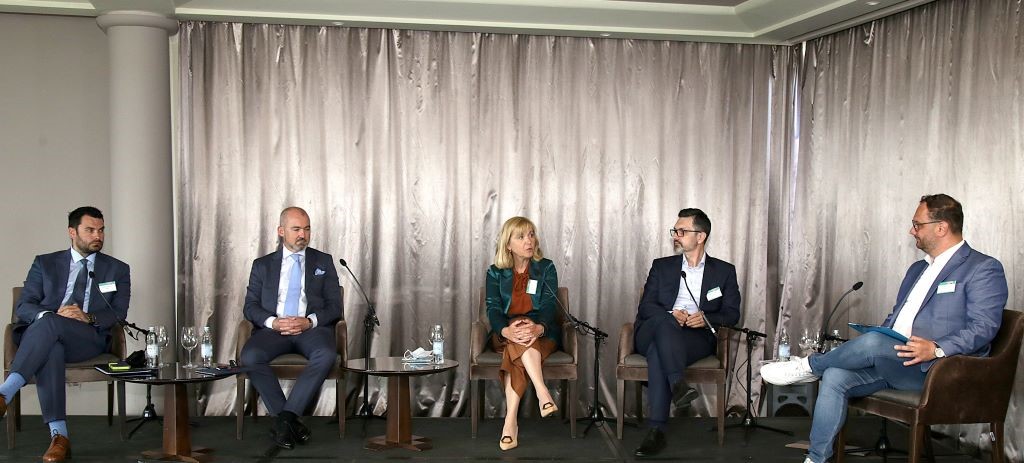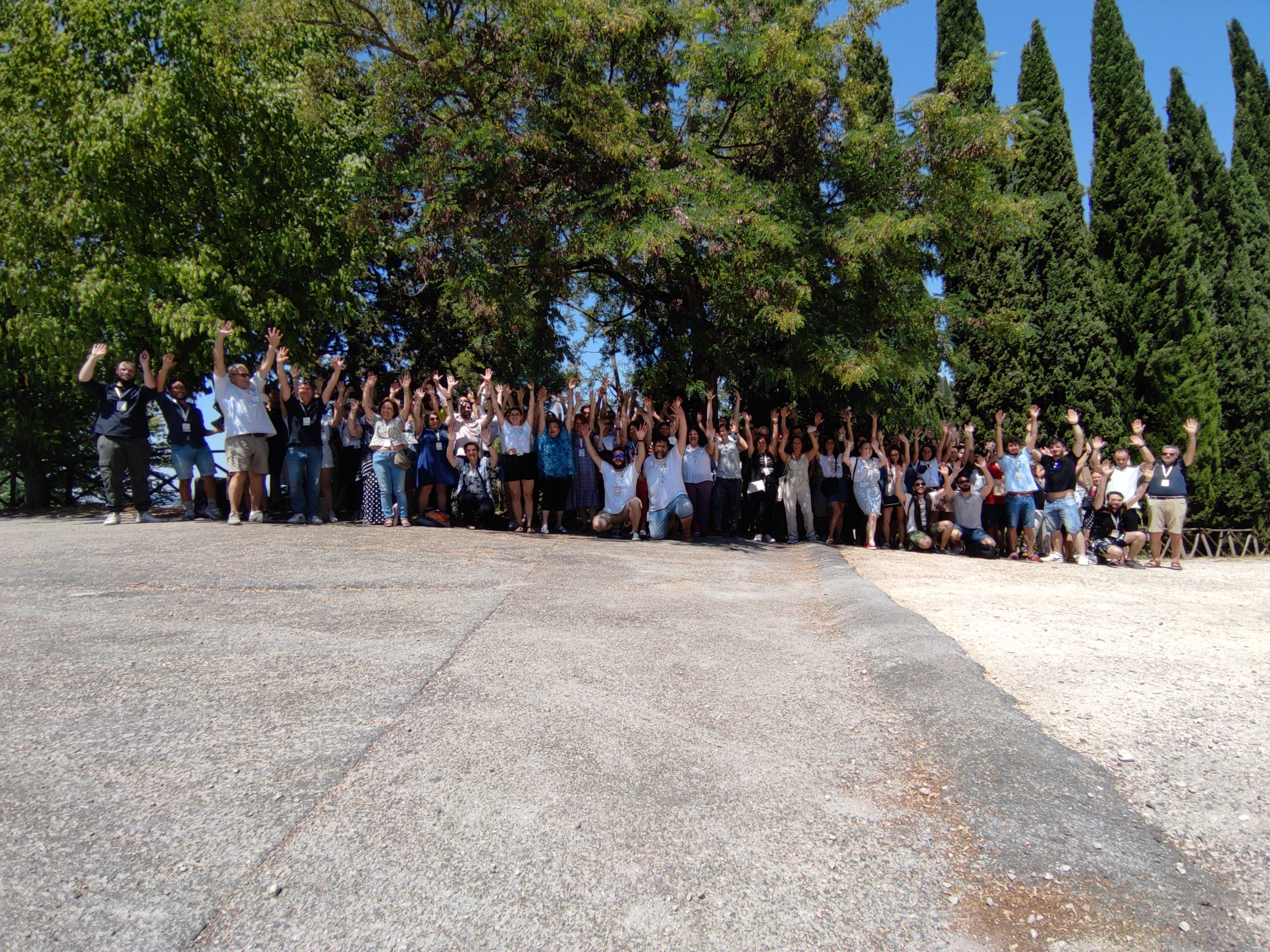Each year, the OECD takes stock of the latest trends in skills, jobs, and global economy in its flagship publication, the OECD Skills Outlook. The 2023 edition of the outlook places digital skills even higher on the global agenda, linking them to economic and social resilience.
To have digital skills may well mean to be able to live and work in today’s world – but what if the way we live and work is changing faster than what we can wrap our heads around?
And talking about fast changes, we cannot fail to mention the fastest of them all, and one we all need to keep up with: the green transition and the looming challenges of climate change. The Global Commission on Adaptation estimates that, compared to children born in the 1960s, those born at the very onset of the COVID-19 pandemic during 2020 in Europe, are likely to experience 2 times more wildfires and 6.8 times more heatwaves throughout their lifetimes.
It’s no longer just about tech skills
Resilience, then, crosses over labour, education, and social dimensions as a new core skill to withstand the impact of climate change and the digital transformation. The 2023 edition of the OECD’s Skills Outlook brings a new perspective towards skills demand, driven by the twin digital and green transition, and towards the role skills policies play in promoting resilience.
Research points to the fact that digitalisation can help mitigate the effects of climate change, provided Europe has a skilled population, and a labour force equipped with the right technical knowledge to drive the digital transformation of EU society and economy forward. The OECD report also recognises the importance of other complementary skills, such as the metacognitive skills that the complex digital information landscapes of today increasingly require – and the ones of tomorrow certainly will.
“If societies are to halt environmental destruction and harness the potential of AI and robotics effectively, they must fundamentally strengthen initial education systems, provide upskilling and reskilling opportunities for adults over the life course, and ensure that skills are effectively mobilised. Investment in skills are critical to building a resilient green and digital transition.”
Tomorrow comes today: demand for advanced digital skills & AI skyrockets
If skills demand is changing, how is this affecting the world around us, and our daily lives? How are the tasks we do expected to change in the future? And what does the “near future” even mean? According to OECD’s report, some skillsets will mark a considerable increase by 2030, with the ability to work with a computer, think critically, act creatively, analyse data and information, and communicate outside of one’s organisation – growing the fastest of all.
Demand for professionals working in AI development and deployment increased drastically from 2019 to 2022 according to online job postings, with around 33%. This is normal and follows the trajectory of more and more AI products being developed and deployed across sectors and contexts. The figure below, taken from the OECD Skills Outlook’s 2023 edition shows the share of online vacancies requiring AI in some countries for that period.

Some interesting differences amongst EU Member States come up in OECD’s report. Throughout Europe, the share of online vacancies detailing AI competence as a required skill increased in all European countries, apart from Austria and Sweden, where no significant increase over time was observed.
New kid on the block: AI as a gamechanger of the world of work
At the same time, the emergence of AI and its potential to transform economy and society differs from the industrial and technological revolution in the sense that AI models are learning more and more how to perform non-routine tasks. While some tasks are indeed endangered, what is more likely to happen is that the focus will need to shift towards improving skillsets that can act complementary to AI software and tools, like decision-making, risk management skills, or ethics.
Hard to catch up? There is more, and responsibility is just as much on employers as it is on citizens. We may have become aware of the various challenges AI brings, and European legislation like the EU AI Act, has made rounds in promoting AI development that is rooted in ethics and goes hand in hand with European values. At the same time, report data highlights a discrepancy in the world of work: less than 1% of online job ads for AI specialists mentioned aspects related to ethics as core requirements.
AI development and deployment is booming not just in Europe, but worldwide. More specifically, newer generative AI models make it harder to distinguish between correct and false information, and as a result, people increasingly end up needing new skills and competences to be able to navigate through the complex digital information landscape. Media literacy, or the “ability to assess, analyse, evaluate and create content in various contexts” is one example of a key competence for the new age, characterised by proliferation of information practically everywhere. But even media literacy itself is changing: as the report highlights, we are now talking about “multiple literacies”, that cannot be wrapped up under the same umbrella. Other skills not normally falling under the tech realm can also help here, including critical thinking, logic, or information-processing skills.
Mapping the distribution of these skills across European countries and regions is crucial to empowering both people and communities. One example is the integration of the European Union’s Digital Economy and Skills Index (DESI) into the new Digital Decade Country reports, which now give a more accurate understanding of the various layers within skills and digital skills, compared to the granularity provided by the previous index.
AI & Machine Translation systems: calling in new skillsets?
Remember how we said the changes are happening fast? Digital mediators such as machine translation technologies (MT) are a great example of the speed with which AI and machine learning are being developed with. Machine translation is the “process of automatically translating content from one language (source) to another (target)”, and translation was one of the first applications of computing power ever since the 1930s. Since the 1980s however, the field has done much more than boom: machine translation tools have literally transformed the way we exchange information and are increasingly deployed across sectors.
But despite developments, MT tools are far from perfect. The OECD highlights they suffer from several limitations meaning it is highly unlikely for them to replace language translation and communication, at least for the time being. Instead, they can be of benefit to those with solid knowledge in the area already, supporting their flow and automating some areas of the translation process.
Linguistic minorities are rarely represented amongst AI developers, and because of the different amount of resources to train AI in different languages, translation quality largely varies. Same goes for women, ethnic and other minorities, and there is the risk of exacerbating inequalities further, rather than reducing existing disparities. MT systems are also less skilled when cultural context or knowledge is involved. Why? Because AI systems are created by humans, and as such carry inherent predispositions. Issues related to ethical and legal issues also come into play here. If a mistake occurs in an important financial document that has been translated, we know who to hold liable – the translator. But what even is liability in the context of content, translated through MT systems?
A brave new wor(l)d: resilience
Things get even more complicated when we boil them down to their essentials, i.e. we look at the individual. Naturally, people acquire and lose proficiency in different skills over time, depending on how often they use them, or as a result of rapidly-changing labour conditions (people leaving one occupation that no longer allows them to make ends meet for another, more in line with demand on the job market).
Yet, as new jobs and profiles emerge, we have been slow to catch up. Less than half of adults (4 out of 10) in OECD countries reported undertaking some sort of training in the last year (both formal and non-formal learning) in 2021. Lack of training is never good, but one aspect where this is especially problematic, is access to work – especially in events where people have to change occupations, or even sectors, due to growing or shrinking demand in the economy. Effectively, this can lead to a stalemate on the job market, as employees are much less agile, and hampers further skills investment.
Recognising the range of skills individuals can have, and their potential to become proficient in different domains, widens the scope for wider participation in training programmes and stimulates investing in skills. There are benefits and motivations on both sides of this debate: on the one hand, employees feel motivated when they acquire new skills, or upgrade existing ones. On the other hand, employers can see the immediate fruit of their labour (or investment, in this case), and speed up business objectives. Of course, it is not just about the labour force: promoting a culture of lifelong learning has to be complemented by equal access to education and up- and re-skilling training opportunities.
Want to know more?
Check out OECD’s full Skills Outlook 2023 on their official website.
Saznaj više
-
Digitalna tehnologija / specijalizacija:
Umjetna inteligencija
Digitalne vještine
-
Razina digitalnih vještina:
Osnovno
Srednja
Napredno
Stručnjak za digitalni sektor
-
Geografski opseg - Država:
Europska Unija
-
Vrsta inicijative:
Međunarodna inicijativa



